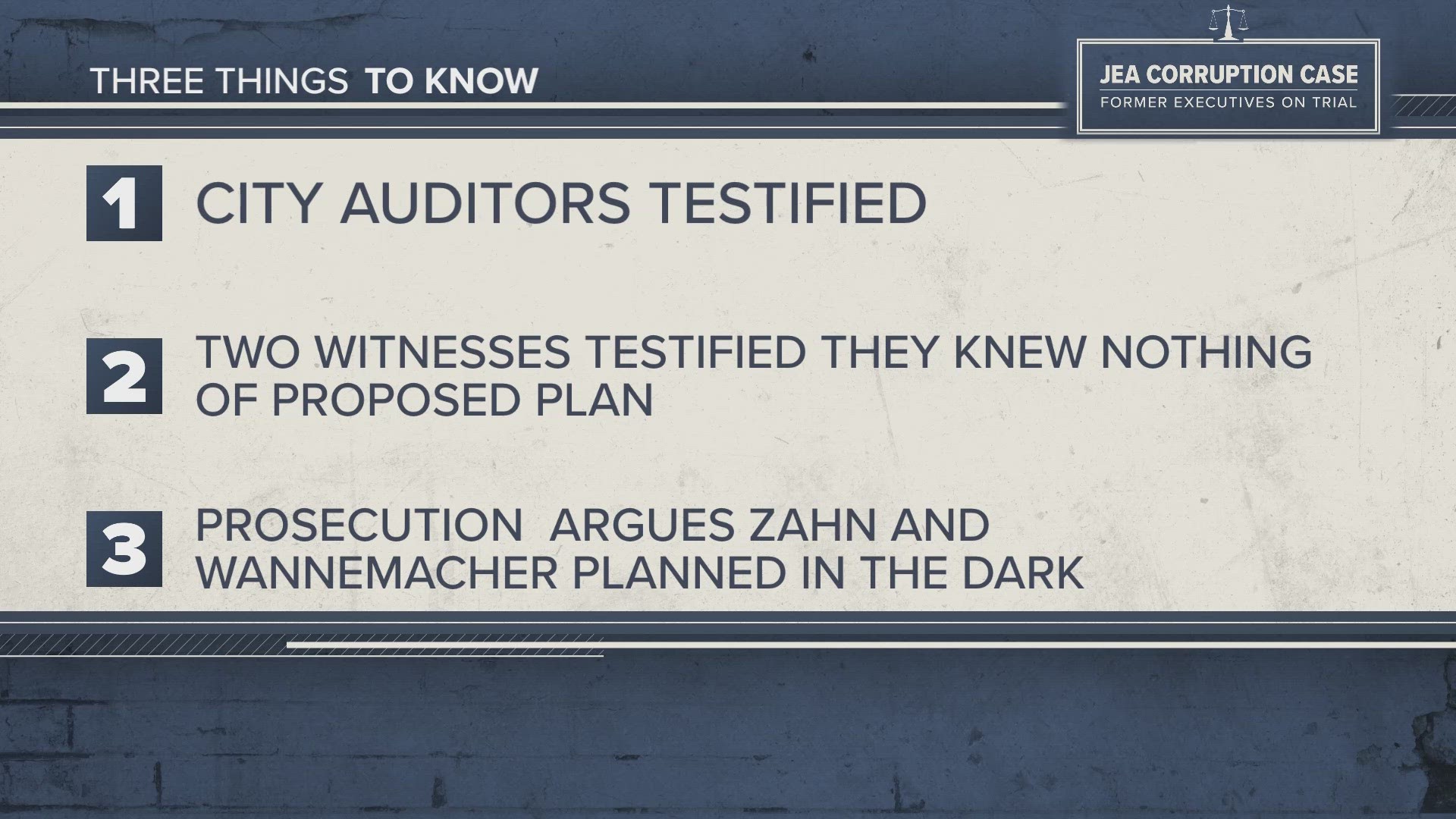JACKSONVILLE, Fla. — Day five of the trial of ex-JEA CEO Aaron Zahn and ex-CFO Ryan Wannemacher continued Tuesday.
In what has been called "the largest corruption trial in Jacksonville's history," Zahn and Wannemacher are accused of crafting a plot to privatize and sell JEA and skim a profit off the top.
The bonus plan, also referred to as a long-term incentive plan and a performance unit plan, would have yielded them hundreds of millions of dollars -- but after it fell apart, it stuck them with charges of conspiracy and wire fraud.
Here's what to know about Tuesday's proceedings.
Board members, who approved the plan, testify
On July 23, 2019, JEA Board of Directors unanimously voted to implement the performance unit plan, a key piece of evidence referenced by the defense, who says any problem with the plan would have been detected before that vote.
Three ex-board members testified Tuesday that had they known executives would get huge payouts from the controversial bonus plan, they would not have endorsed it.
Kelly Flanagan, who served on the board from 2015 to 2020, was up first. Flanagan, who has made this point under oath before, said she would not have backed the plan if she knew the monetary implications.
She was the first member of the board -- whose vote has been a cornerstone of the defense's argument -- to testify.
Former board members Rev. Frederick Newbill and Christian Andrew "Andy" Allen said the same.
City auditors, whose memo kicked off investigation, take the stand
Kyle Billy, the now-retired city auditor whose memo led the city council to look into the bonus plan, began testifying late Monday. He returned to the stand Tuesday morning, where he discussed being skirted by Wannemacher for months.
He referred to an email with questions about the plan that was first sent in August. While he conceded that, as shown in records, Wannemacher had requested to "circle back" in a couple of weeks, he still had not heard back going into the fall. The defense argued that once Billy had requested a meeting with Wannemacher at the end of October, Wannemacher agreed to it the next day; Billy argued that Wannemacher had avoided the auditor's office far too long by that point.
The defense took issue with the process of creating the memo, questioning why Billy did not run the memo by JEA before turning it into the city council. Billy testified that the concerns laid out in the memo were also laid out in the questions he sent to Wannemacher, and JEA would have had to be aware of the concerns.
Billy also talked about how his office ran the numbers to figure out the potential pay out from the performance-unit plan. He argued that the government was harping on opinions, and the memo was based only on fact -- how much money the plan could make, depending on the profit from a sale of JEA.
"The formula approved by the board is pretty clear," he said.
Billy took the witness stand after Kim Taylor, a city council auditor who helped prepare the memo.
Parts of Taylor's testimony Monday became confrontational, but she stuck by her testimony, which was corroborated by Billy the next day.
"Part of Zahn's defense appears to involve attempting to discredit the auditors, who in real time and in the years that followed the botched 2019 privatization effort were largely hailed for bringing the alleged payout scheme to light," the Florida-Times Union reported.
Sale or no sale?
Throughout the trial, Zahn and Wannemacher’s attorneys have sought to deny that they were set on a sale. Privatizing and selling JEA was crucial to the payout at the center of the case: No intention to sell, no intention to deceive and cash out.
During the July 23, 2019 meeting, the board authorized JEA’s executives to explore privatizing the utility -- though public records show efforts to prepare for a sale predated this resolution.
But the defense argues that the sale was just one option that was being considered, and was never set it stone, rendering the plan non-viable.
Zahn's attorney, Eddie Suarez, argued that the board didn't technically approve a sale of JEA because privatization was only one potential outcome.
When questioning former-board member Flanagan, Wannemacher’s attorney Jim Felman asked her if there was an “array” of choices for this plan. She testified that there were several options, and a sale had not been chosen. A video of Newbill assuring the board that there would be no sale was also played for the jury.
Proof of the executives pouring resources into the sale, including off-site meetings with buyers that predated any on-record talk of the sale, have not been presented to the jury yet.
Special Agent Angela Hill with the FBI, who led the investigation into JEA, testified that NextEra Energy, the owner of Florida Power and Light, was prepared to pay $11.05 billion for JEA.

